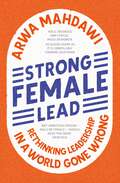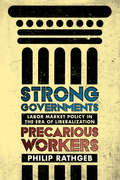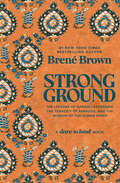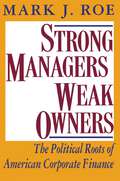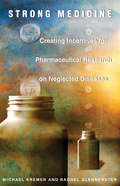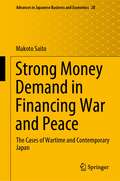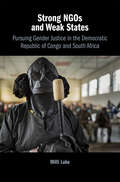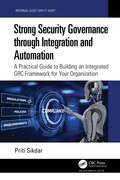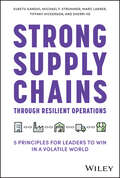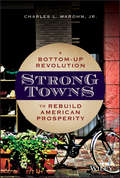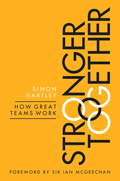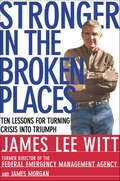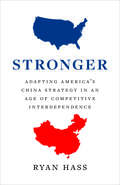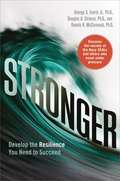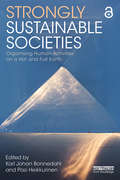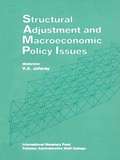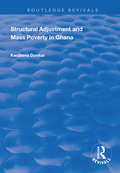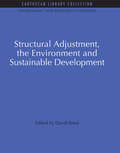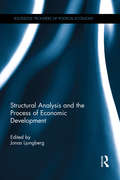- Table View
- List View
Strong Female Lead: Lessons From Women In Power
by Arwa MahdawiA response to the woeful inadequacy of male leadership, and an investigation into the qualities demonstrated by the female leaders showing us how it's done. Including original research and interviews with Madeleine Albright, Mary Robinson, Alicia Garza, and many others.The first two decades of the 21st Century have seen financial collapse, a global pandemic, the devastation of our environment and the disintegration of democracies. But while some at the top are telling us 'it is what is it', there's a new generation of leaders showing the world how to be better. They're building trust, investing wisely and acting decisively. And they've got one thing in common.Women have been taught to 'lean in' and act like men to get ahead. But as the financial, environmental, and social systems crumble, isn't it time we had a different plan? And most importantly, what can women in power teach all of us about leadership? (P) 2021 Hodder & Stoughton Ltd
Strong Female Lead: Lessons from Women in Power
by Arwa MahdawiFrom climate change to massive inequality to the decline of trust, the world is facing a number of interconnected crises. Above all else, however, it's facing a crisis of leadership. We have confused confidence with competence and chosen our leaders based not on their skillset and ability, but on how closely they fit our image of a leader. And, funnily enough, that image is very masculine. It's time to change the narrative around leadership. It's time we stopped pathologizing femininity and recognized that the traits we associate with women - things like empathy and collaboration - are strengths, not weaknesses. It's time we stopped telling women to act like men and started telling men to lead like women. Not for politically correct reasons, but for existential ones.The world has never been in greater need of good leaders. Strong Female Lead shows us what they're made of.ReviewsStrong Female Lead is as razor sharp as it is compelling. Utterly contemporary and relevant, Mahdawi is the best writer to give us a long overdue book that speaks so brilliantly to, and about, all women. - Chimene SuleymanThis is a book I wanted to read before I knew it existed. It explores the vital question - What would the world look like if all positions of power were held by people who prioritised empathy and compassion? People who were not led by ego but by the idea of collaboration and inclusivity? Arwa proves without a shadow of doubt, that our future leaders need to be female or to be men who respect and emulate female leadership. I just hope we can hurry up and get there, for all of our sakes. - Annie MacThis is a bold, rigorous and lyrical work which feels both timely and essential. Mahdawi has made a thoroughly nuanced and utterly compelling argument for the new and better forms of leadership that our world urgently needs. Please read it, engage with it, then pass it on. - Musa OkwongaThe opposite of a dry marketing manual - funny, intelligent and bursting with ideas from women I'd never heard of, who deserve to be praised for their leadership Pandora SykesAny ambitious young person - male or female - should read this book. - Sirin KaleArwa Mahdawi's latest book offers a bracing assessment of our current state of financial, ecological, and biopolitical collapse. Turning her attention to the experiences and strategies of women in leadership, Mahdawi brushes aside stale cliches about "leaning in" and "girl bossing" to uncover new social and political strategies. By turns pragmatic, idealistic, and moving, Strong Female Lead will be devoured by powerful women and those who love them. - Grace Lavery, author of Please Miss.So often the reason we don't hear about more women in history lessons is because their stories have never been told. Arwa Mahdawi is here to change that! Strong Female Lead is a fascinating, wonderful read and the most incredible argument for why a specifically female model of leadership might actually be the more powerful and sustainable one. This book will be a bible for any woman searching for inspiration but more importantly it needs to be read by MEN! It's time young boys started idolising female leaders in the same way girls have idolised powerful men throughout history. I am giving each of my brothers a copy of this book for Christmas! - Scarlett Curtis
Strong Female Lead: Lessons from Women in Power
by Arwa MahdawiFrom climate change to massive inequality to the decline of trust, the world is facing a number of interconnected crises. Above all else, however, it's facing a crisis of leadership. We have confused confidence with competence and chosen our leaders based not on their skillset and ability, but on how closely they fit our image of a leader. And, funnily enough, that image is very masculine. It's time to change the narrative around leadership. It's time we stopped pathologizing femininity and recognized that the traits we associate with women - things like empathy and collaboration - are strengths, not weaknesses. It's time we stopped telling women to act like men and started telling men to lead like women. Not for politically correct reasons, but for existential ones.The world has never been in greater need of good leaders. Strong Female Lead shows us what they're made of.ReviewsStrong Female Lead is as razor sharp as it is compelling. Utterly contemporary and relevant, Mahdawi is the best writer to give us a long overdue book that speaks so brilliantly to, and about, all women. - Chimene SuleymanThis is a book I wanted to read before I knew it existed. It explores the vital question - What would the world look like if all positions of power were held by people who prioritised empathy and compassion? People who were not led by ego but by the idea of collaboration and inclusivity? Arwa proves without a shadow of doubt, that our future leaders need to be female or to be men who respect and emulate female leadership. I just hope we can hurry up and get there, for all of our sakes. - Annie MacThis is a bold, rigorous and lyrical work which feels both timely and essential. Mahdawi has made a thoroughly nuanced and utterly compelling argument for the new and better forms of leadership that our world urgently needs. Please read it, engage with it, then pass it on. - Musa OkwongaThe opposite of a dry marketing manual - funny, intelligent and bursting with ideas from women I'd never heard of, who deserve to be praised for their leadership Pandora SykesAny ambitious young person - male or female - should read this book. - Sirin KaleArwa Mahdawi's latest book offers a bracing assessment of our current state of financial, ecological, and biopolitical collapse. Turning her attention to the experiences and strategies of women in leadership, Mahdawi brushes aside stale cliches about "leaning in" and "girl bossing" to uncover new social and political strategies. By turns pragmatic, idealistic, and moving, Strong Female Lead will be devoured by powerful women and those who love them. - Grace Lavery, author of Please Miss.So often the reason we don't hear about more women in history lessons is because their stories have never been told. Arwa Mahdawi is here to change that! Strong Female Lead is a fascinating, wonderful read and the most incredible argument for why a specifically female model of leadership might actually be the more powerful and sustainable one. This book will be a bible for any woman searching for inspiration but more importantly it needs to be read by MEN! It's time young boys started idolising female leaders in the same way girls have idolised powerful men throughout history. I am giving each of my brothers a copy of this book for Christmas! - Scarlett Curtis
Strong Governments, Precarious Workers: Labor Market Policy in the Era of Liberalization
by Philip RathgebWhy do some European welfare states protect unemployed and inadequately employed workers ("outsiders") from economic uncertainty better than others? Philip Rathgeb’s study of labor market policy change in three somewhat-similar small states—Austria, Denmark, and Sweden—explores this fundamental question. He does so by examining the distribution of power between trade unions and political parties, attempting to bridge these two lines of research—trade unions and party politics—that, with few exceptions, have advanced without a mutual exchange.Inclusive trade unions have high political stakes in the protection of outsiders, because they incorporate workers at risk of unemployment into their representational outlook. Yet, the impact of union preferences has declined over time, with a shift in the balance of class power from labor to capital across the Western world. National governments have accordingly prioritized flexibility for employers over the social protection of outsiders. As a result, organized labor can only protect outsiders when governments are reliant on union consent for successful consensus mobilization. When governments have a united majority of seats, on the other hand, they are strong enough to exclude unions. Strong Governments, Precarious Workers calls into question the electoral responsiveness of national governments—and thus political parties—to the social needs of an increasingly numerous group of precarious workers. In the end, Rathgeb concludes that the weaker the government, the stronger the capacity of organized labor to enhance the social protection of precarious workers.
Strong Ground: The Lessons of Daring Leadership, the Tenacity of Paradox, and the Wisdom of the Human Spirit (A Dare to Lead Book)
by Brené BrownNEW YORK TIMES BESTSELLER • Brené Brown returns with an urgent call to reimagine the essentials of courageous leadership. In a time when uncertainty runs deep and bluster, hubris, and even cruelty are increasingly framed as acceptable leadership, Brown delivers practical, actionable insights that illuminate the mindsets and skill sets essential to reclaiming focus and driving growth through connection, discipline, and accountability.Over the past six years, Brené Brown, along with a global community of coaches and facilitators, has taken more than 150,000 leaders in 45 countries through her Dare to Lead courage-building work. In Strong Ground, Brown shares the lessons from these experiences along with wisdom from other thinkers. This is a vital playbook for everyone from senior leaders developing and executing complex strategies to Gen Z-ers entering and navigating turbulent work environments. It is also an unflinching assessment of what happens when we continue to perpetuate the falsehood that performance and wholeheartedness are mutually exclusive. With equal amounts of optimism and caution about AI, Brown writes, &“I hear a lot of experts trying to soothe people&’s anxiety about the pace of technological change by offering platitudes like, What makes us human will ensure our relevance. This is dangerous simply because, right now, we&’re not especially good at what makes us human. We&’re not hardwired for this level of uncertainty, and many of us feel as if the constant need to self-protect is driving the humanity right out of us. This is why organizational transformation today must foster deep connection, deep thinking, and deep collaboration. We need the courage to lead people in a way that honors and protects the wisdom of the human spirit.&”Brown offers a broad assessment of the skill sets and mindsets we need moving forward, including the capacity for respectful and difficult conversations, increased productive urgency and smart prioritization rather than reactivity, and strategic risk-taking, paradoxical thinking, and situational and anticipatory awareness skills. She identifies the toughest skill set as the discipline, humility, and confidence to unlearn and relearn. Brown writes, &“Individuals and organizations are building new muscles. Finding our strong ground—that athletic stance—is the only thing that can provide both unwavering stability in a maelstrom of uncertainty and a platform for the fast, explosive change that the world is demanding.&”
Strong Like Water: How I Found the Courage to Lead with Love in Business and in Life
by Laila TarrafLaila Tarraf was the Chief People Officer for Peet’s Coffee and Tea, the iconic Berkeley coffee roaster that launched the craft coffee movement in America, but she had a secret: she was failing in the most important relationships in her life. Yes, she was a strong and effective business leader, the successful daughter of immigrants, and the mother of a toddler; but she was also disconnected from her own feelings and had little patience for the feelings of others. All that changed when life handed her a trifecta of losses: her husband died of an accidental drug overdose, and her parents' deaths followed in quick succession. Laila had spent her life leading from the head, convinced that any display of vulnerability would make her soft. What she didn’t expect was that soft would turn out to be strong. As she reconnected to her heart, one painful step at a time, something remarkable happened: she became a better leader, a better mother, and a better person. Her heart turned out to be the true source of her power, at home and at work. This is a book about healing, about waking up, about learning who you are—who you really, truly are at the core—and reclaiming and embracing all the pieces of yourself you long ago abandoned in the name of survival. Women longing for balance will discover a path to infusing our leadership and relationships with love, compassion, and authenticity.
Strong Managers, Strong Owners
by Harry Korine Pierre-Yves GomezThe family firm preparing generational change, the partnership that welcomes new partners, and the shareholders of a firm that chooses to go public are making decisions that will have an impact on strategy and management. Conversely, a change in strategy such as a move to diversify or a decision to take on more risk in a business can make the firm more attractive to some shareholders and less attractive to others and is therefore not ownership neutral. Opening the black box of agency theory, Korine and Gomez show how management and ownership interact to shape the strategy of the firm. In their view, the critical question to ask is not what is the best strategy, but rather, who is the strategy for? With numerous detailed examples, Strong Managers, Strong Owners is an invaluable resource for company owners, board members and executives, as well as their advisors in strategy and governance.
Strong Managers, Weak Owners: The Political Roots of American Corporate Finance
by Mark J. RoeIn this major reinterpretation of the evolution of the American corporation, Mark Roe convincingly demonstrates that the ownership structure of large U.S. firms owes its distinctive character as much to politics as to economics and technology. His provocative examination addresses essential issues facing American businesses today as they compete in the new international marketplace.
Strong Medicine: Creating Incentives for Pharmaceutical Research on Neglected Diseases
by Michael Kremer Rachel GlennersterMillions of people in the third world die from diseases that are rare in the first world--diseases like malaria, tuberculosis, and schistosomiasis. AIDS, which is now usually treated in rich countries, still ravages the world's poor. Vaccines offer the best hope for controlling these diseases and could dramatically improve health in poor countries. But developers have little incentive to undertake the costly and risky research needed to develop vaccines. This is partly because the potential consumers are poor, but also because governments drive down prices. In Strong Medicine, Michael Kremer and Rachel Glennerster offer an innovative yet simple solution to this worldwide problem: "Pull" programs to stimulate research. Here's how such programs would work. Funding agencies would commit to purchase viable vaccines if and when they were developed. This would create the incentives for vaccine developers to produce usable products for these neglected diseases. Private firms, rather than funding agencies, would pick which research strategies to pursue. After purchasing the vaccine, funders could distribute it at little or no cost to the afflicted countries. Strong Medicine details just how these legally binding commitments would work. Ultimately, if no vaccines were developed, such a commitment would cost nothing. But if vaccines were developed, the program would save millions of lives and would be among the world's most cost-effective health interventions.
Strong Minds: How To Unlock The Power Of Elite Sports Psychology To Accomplish Anything
by Scott Douglas Noel Brick“Highlights the mental strategies elite athletes employ to get an edge on their competition.”—The New York Times With an all-new foreword: competition-tested cognitive strategies to help triumph over any obstacle If you ask research psychologist Noel Brick and bestselling fitness writer Scott Douglas, the “dumb jock” stereotype is way out of bounds. No world-class athlete succeeds without a strong mental game, including unique ways of analyzing situations, self-motivating, and even thinking about time. Cutting-edge discoveries (some by Dr. Brick himself) reveal how champions do it—and how we can, too. Brick and Douglas pair groundbreaking science with instructive moments across the sports realm to show how legendary athletes like marathoner Meb Keflezighi, World Cup champion soccer player Megan Rapinoe, and Olympian Michael Phelps stay on top of their game. Whether it’s sticking the landing at a job interview or racing your thesis to the finish line, Strong Minds is a slam-dunk approach for accomplishing anything. Publisher’s note: Strong Minds was previously published in hardcover as The Genius of Athletes.
Strong Money Demand in Financing War and Peace: The Cases of Wartime and Contemporary Japan (Advances in Japanese Business and Economics #28)
by Makoto SaitoThis book theoretically and empirically investigates the emergence of strong money demand in wartime Japan (1937–1945), its disappearance after the end of the war (1945–1949), and the reemergence of strong money demand in contemporary Japan (from 1995 to the present) in terms of the effects on fiscal activities and the price level. An augmented fiscal/monetary theory of the price level is constructed from a close examination of the strong money demand present in these periods. Then, profoundly puzzling phenomena such as mild deflation despite monetary expansion, low long-term interest rates despite fiscal unsustainability, and weak aggregate demand despite near-zero rates of interest, all of which are actually being observed in contemporary Japan, can now be interpreted in line with the above augmented theory. In the present, strong money demand at near-zero rates endows the Japanese government with maximum fiscal flexibility. However, if it disappeared for some reason, prices would surge to the quantity theory of money level, and fiscal sustainability would have to be restored. In the future, alternative currency units issued by private banks might carry out a purge of such strong demand for the yen.
Strong NGOs and Weak States: The Pursuit Of Gender Justice In The Democratic Republic Of Congo And South Africa
by Milli LakeOver the past decade, DR Congo and South Africa have attracted global attention for high rates of sexual and gender-based violence. Why is it that courts in eastern DR Congo have offered a robust judicial response, prioritizing gender crimes despite considerable logistical challenges, whilst courts in South Africa, home to a far stronger legal infrastructure and human rights record, have failed to provide justice to victims of similar crimes? <P><P>Lake shows that state fragility in DR Congo has created openings for human rights NGOs to influence legal processes in ways that have proved impossible in countries like South Africa, where the state is stronger. Yet exploiting opportunities presented by state fragility to pursue narrow human rights goals invites a host of new challenges. Strong NGOs and Weak States documents the promises and pitfalls of human rights and rule of law advocacy undertaken by NGOs in strong and weak states alike.<P> Challenges existing knowledge of human rights and transnational advocacy by demonstrating that NGOs often show more immediate, direct and visible results of their human rights advocacy in weak states than in strong ones.<P> Advises policy-makers, practitioners, and donors in the fields of human rights and the rule of law of the unintended consequences of bypassing the central state in pursuit of narrow human rights goals.<P> Authored by a scholar and practitioner possessing first-hand expertise in human rights advocacy, rule of law development, and legal capacity building across sub-Saharan Africa.
Strong Security Governance through Integration and Automation: A Practical Guide to Building an Integrated GRC Framework for Your Organization (Internal Audit and IT Audit)
by Priti SikdarThis book provides step by step directions for organizations to adopt a security and compliance related architecture according to mandatory legal provisions and standards prescribed for their industry, as well as the methodology to maintain the compliances. It sets a unique mechanism for monitoring controls and a dashboard to maintain the level of compliances. It aims at integration and automation to reduce the fatigue of frequent compliance audits and build a standard baseline of controls to comply with the applicable standards and regulations to which the organization is subject. It is a perfect reference book for professionals in the field of IT governance, risk management, and compliance. The book also illustrates the concepts with charts, checklists, and flow diagrams to enable management to map controls with compliances.
Strong Supply Chains Through Resilient Operations: Five Principles for Leaders to Win in a Volatile World
by Michael F. Strohmer Suketu Gandhi Marc Lakner Tiffany Hickerson Sherri HeFuture-proof your firm’s supply chains with a renewed focus on resilience In Strong Supply Chains Through Resilient Operations: Five Principles for Leaders to Win in a Volatile World, a team of dedicated, veteran operations strategists delivers a practical and hands-on discussion of how to future-proof your company’s supply chains through a relentless focus on resilience. In the book, you’ll discover how to shift your firm’s emphasis from “low-cost” to “low volatility” as you protect your company against the supply and demand shocks associated pandemics, wars, labor disputes, and trade conflicts. You’ll also learn about: Real-world examples of companies realizing long-term competitive advantage by implementing the shifts advocated by the authors Why seeking to build mutually beneficial, long-term relationships with dependable suppliers is preferable to always choosing the cheapest option How a renewed focus on diversity and new ways of working can create resilient operations teams that pass on value to your customers An effective and essential discussion of one of the most prominent challenges facing contemporary companies around the world, Strong Supply Chains Through Resilient Operations is a need-to-read book for managers, executives, business leaders, entrepreneurs, operations and supply chain professionals, and anyone else with a stake in the smooth operation of their firm.
Strong Towns: A Bottom-Up Revolution to Rebuild American Prosperity
by Charles MarohnA new way forward for sustainable quality of life in cities of all sizes Strong Towns: A Bottom-Up Revolution to Build American Prosperity is a book of forward-thinking ideas that breaks with modern wisdom to present a new vision of urban development in the United States. Presenting the foundational ideas of the Strong Towns movement he co-founded, Charles Marohn explains why cities of all sizes continue to struggle to meet their basic needs, and reveals the new paradigm that can solve this longstanding problem. Inside, you’ll learn why inducing growth and development has been the conventional response to urban financial struggles—and why it just doesn’t work. New development and high-risk investing don’t generate enough wealth to support itself, and cities continue to struggle. Read this book to find out how cities large and small can focus on bottom-up investments to minimize risk and maximize their ability to strengthen the community financially and improve citizens’ quality of life. Develop in-depth knowledge of the underlying logic behind the “traditional” search for never-ending urban growth Learn practical solutions for ameliorating financial struggles through low-risk investment and a grassroots focus Gain insights and tools that can stop the vicious cycle of budget shortfalls and unexpected downturns Become a part of the Strong Towns revolution by shifting the focus away from top-down growth toward rebuilding American prosperity Strong Towns acknowledges that there is a problem with the American approach to growth and shows community leaders a new way forward. The Strong Towns response is a revolution in how we assemble the places we live.
Strong Winds and Widow Makers: Workers, Nature, and Environmental Conflict in Pacific Northwest Timber Country (Working Class in American History)
by Steven C. BedaOften cast as villains in the Northwest's environmental battles, timber workers in fact have a connection to the forest that goes far beyond jobs and economic issues. Steven C. Beda explores the complex true story of how and why timber-working communities have concerned themselves with the health and future of the woods surrounding them. Life experiences like hunting, fishing, foraging, and hiking imbued timber country with meanings and values that nurtured a deep sense of place in workers, their families, and their communities. This sense of place in turn shaped ideas about protection that sometimes clashed with the views of environmentalists--or the desires of employers. Beda's sympathetic, in-depth look at the human beings whose lives are embedded in the woods helps us understand that timber communities fought not just to protect their livelihood, but because they saw the forest as a vital part of themselves.
Stronger Together: How Great Teams Work
by Simon HartleyWhat do world-class teams do that others don't? How do those teams think, make decisions and respond to challenges?Stronger Together will help readers to understand what differentiates world-class teams from the rest. Using these insights, readers can apply the same key principles when leading - or being a part of - a team, whether they are in a business or sports environment. To illustrate how world-class teams operate and how they're led, the author draws on examples of teamwork from a diverse range of disciplines, from The Red Arrows to SAS Units, a Formula One Pit Crew, Americas Cup yacht crews, World Championship sports teams and more. He includes case studies from his work with elite professional, international and Olympic sports teams, plus executive leadership teams from businesses.This truly insightful and fascinating book lifts the lid on what it takes to be the best and how we can translate these lessons to our own performance.
Stronger in the Broken Places: Ten Lessons for Turning Crisis into Triumph
by James Morgan James Lee WittFrom the former director of the Federal Emergency Management Agency, how to manage your business in the face of challenge, change, and potential disasterFor James Lee Witt, the man who rebuilt America's emergency response system, the most inspiring and effective lessons--about responsibility, team building, planning, and taking action--have guided real-life heroes through extraordinary situations. These lessons can be applied to business to guide you through the pressures you face each week--or once in a career or a lifetime. Whether describing earthquake preparation in California, moving a Missouri town out of a floodplain, or shoring up walls and spirits after the Oklahoma City bombing, Witt captures the moments when leaders step forward, how they motivate others, and what they need to triumph over adversity. Witt's home-spun wisdom teaches us to "Tear Down the Stovepipes" to build effective teamwork by thinking horizontally, not vertically; to find energizing people who improve morale, whether a V.P.'s secretary or a key client, since "A Lightning Rod Works Both Ways"; and to establish systems for capturing what happens--what goes right and what goes wrong--to ensure that every challenge leaves you "Stronger in the Broken Places." To bring home the ten lessons in this inspiring and useful book, Witt shares examples and strategies from corporations--from Malden Mills and Intel to Swissair and Kmart--who have overcome crisis by applying the same principles to their business every day.
Stronger: Adapting America’s China Strategy in an Age of Competitive Interdependence
by Ryan HassAn examination of the U.S.–China relationship that charts a new path for America focusing on its existing advantages Ryan Hass charts a path forward in America&’s relationship and rivalry with China rooted in the relative advantages America already possesses. Hass argues that while competition will remain the defining trait of the relationship, both countries will continue to be impacted—for good or ill—by their capacity to coordinate on common challenges that neither can solve on its own, such as pandemic disease, global economic recession, climate change, and nuclear nonproliferation. Hass makes the case that the United States will have greater success in outpacing China economically and outshining it in questions of governance if it focuses more on improving its own condition at home than on trying to impede Chinese initiatives. He argues that the task at hand is not to stand in China&’s way and turn a rising power into an enemy in the process but to renew America&’s advantages in its competition with China.
Stronger: Develop the Resilience You Need to Succeed
by George S. Everly Jr. Dennis K. Mccormack Douglas A. StrouseProfessional athletes, surgeons, first responders--all perform remarkable feats in the face of intense stress. Why do they thrive under pressure, while others succumb?What separates the two is attitude. Resilient people meet adversity head-on and bounce back from setbacks. They seem to naturally exude an inner strength--but studies show that resilience is something that anyone can build. Analyzing the heroic exploits of U.S. Navy SEALs and others who succeed against all odds, Stronger identifies five factors that combine to unlock deep reserves of personal power:Active optimism--believe that you can change things for the betterDecisive action--you can't succeed if you don't take the leapMoral compass--face any challenge with clear guiding principlesRelentless tenacity--try, try againInterpersonal support--gain strength from those around youDrawing on the unique perspective of a standout team of authors (a stress management expert, a skilled entrepreneur, and a Navy SEAL), Stronger explores the science behind resilience and explains how you can develop this vital trait for yourself. Whatever your profession, today's demanding world calls for a special kind of strength. This revealing book holds the key.
Strongly Sustainable Societies: Organising Human Activities on a Hot and Full Earth (Routledge Studies in Sustainability)
by Karl Johan Bonnedahl Pasi HeikkurinenThe response of the international community to the pressing socio-ecological problems has been framed around the concept of ‘sustainable development’. The ecological pressure, however, has continued to rise and mainstream sustainability discourse has proven to be problematic. It contains an instrumental view of the world, a strong focus on technological solutions, and the premise that natural and human-made ‘capitals’ are substitutable. This trajectory, which is referred to as ‘weak sustainability’, reproduces inequalities, denies intrinsic values in nature, and jeopardises the wellbeing of humans as well as other beings. Based on the assumptions of strong sustainability, this edited book presents practical and theoretical alternatives to today’s unsustainable societies. It investigates and advances pathways for humanity that are ecologically realistic, ethically inclusive, and receptive to the task’s magnitude and urgency. The book challenges the traditional anthropocentric ethos and ontology, economic growth-dogma, and programmes of ecological modernisation. It discusses options with examples on different levels of analysis, from the individual to the global, addressing the economic system, key sectors of society, alternative lifestyles, and experiences of local communities. Examining key topics including human–nature relations and wealth and justice, this book will be of great interest to students and scholars of environmental and development studies, ecological economics, environmental governance and policy, sustainable business, and sustainability science.
Structural Adjustment and Macroeconomic Policy Issues
by V. A. JafareyA report from the International Monetary Fund.
Structural Adjustment and Mass Poverty in Ghana (Routledge Revivals)
by Kwabena DonkorFirst published in 1997, this volume looks at the rationale for, the implementation of, and the economic and social effect of the World Bank Structural Adjustment Policy (SAP) in Ghana from the early 1980s to the early 1990s. It shifts the focus from a primarily economic evaluation of these programmes and includes issues such as their impact on vulnerable groups within the Ghanaian society and on poverty in general. Therefore, it must be asked whether the ‘ordinary Ghanaian’ has gained anything from any wealth creation in Ghana. The book will be useful for both academic and policy purposes.
Structural Adjustment, the Environment and Sustainable Development: Structural Adjustment, The Environment And Sustainable Development (Environmental and Resource Economics Set)
by David ReedThis is a pioneering study which should serve as a model for future research and will to a wide audience' Dharam Ghai, Director United Nations Research Institute for Social Development Structural Adjustment and the Environment (Earthscan, 1992) was the first book to fully examine the effects of 'structural adjustment programmes the economic reform policies required by the World Bank and IMF as part of their lending operations with borrowing countries. To widespread Critical acclaim it exposed the damaging environmental and social effects of structural adjustment policies, and called for a thorough revision of the then-current development policy. This new work; Structural Adjustment, the Environment and sustainable Development is a major step forward in the study of structural adjustment policies. It looks in detail at new research and analysis into their effects, and incorporates recent studies by a wide range of academics and policy-makers, leading experts and institutes. Focusing on nine in-depth case studies, the book examines the complex links between macroeconomic policies, social impacts and environmental outcomes, and takes a forward-looking perspective in outlining the alternatives to current structural adjustment policies. Review quotes for Structural Adjustment and the Environment 'Should be essential reading for all students of development' Third World Planning Review 'Breaks new ground in the debate on structural adjustment generally. and in the environment/development debate' International Affairs 'The most substantial contribution to date to what is undoubtedly an important area' Development and Change David Reed is director of the Macroeconomics for Sustainable Development Programme of WWF International, and editor of Structural Adjustment and the Environment (Earthscan, 1992). Originally published in 1996
Structural Analysis and the Process of Economic Development (Routledge Frontiers of Political Economy)
by Jonas LjungbergEconomic development is full of discontinuities. Mainstream economists perceive these as external disturbances to a natural state of equilibrium, but this book argues that much of the discontinuities are part of economic development, suggesting that patterns can be understood with structural analysis. Structural Analysis and the Process of Economic Development presents a detailed analysis of the trajectory of Swedish economic change since the nineteenth century. The emergence of structural analysis in economic research is reviewed, as well as a chapter devoted to development blocks, a key concept that was outlined in the 1940s and that has much in common with the more recent notions ‘techno-economic paradigms’ and ‘general-purpose technologies’. Structural analysis and the major contributions by Schön are introduced in this book. Also highlighted is Sweden’s integration into the international economy via the nineteenth century capital markets, along with structural analysis as a tool for understanding climate change. The recent technique of wavelet analysis and its potential for structural analysis is demonstrated in a non-technical chapter. This book is suitable for those who are interested in and study political economy, economic history and European history.

